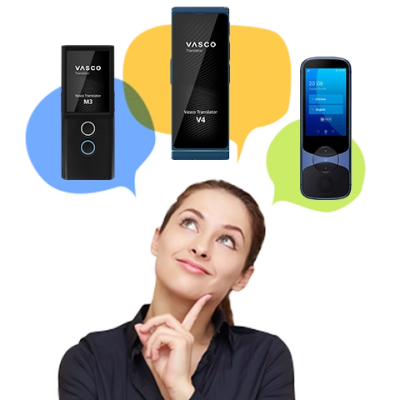First of all, ask yourself a question: Why do I need an electronic translator?
The question of purpose is an essential one.
An electronic translator is a portable, easy to work with device that possesses all the written and spoken tools to aid in the learning of a foreign language or in travel to a foreign country. Choosing an electronic translator can be a difficult process. It is important to keep in mind the intended use of the translator when coming to a decision. Secondly, you need to decide what languages are spoken in the destination you’re going to or what language your business partner’s use. Many a traveller have wondered if the Swiss language really exists or how many cases Brazilian has. And that’s not a joke! Please check Wikipedia before your flight, then you will know if you need an electronic translator that speaks Mandarin or Cantonese, Khmer or Malayalam. Nonetheless, the most popular languages are, of course, English, Spanish, French and German. These you will find in almost all of the translators. More European and a couple of Asian languages are installed with the Vasco Translator and Vasco Traveler, these translators are perfect at communication. At the time of choosing an electronic translator it is important to keep in mind the intended use of the device. Whether you are going to use it only for learning a new language, for personal use or for an aid while travelling. All these factors come into play when choosing the device that is right for you. If you are planning to travel abroad and leave the safety of your home country than the Vasco Traveler Premium would be the perfect choice as it is equipped with a GPS, currency converter and many other important applications that will come in handy while traveling to a foreign country. It is important to review all the options provided by each translator and then to choose the one that will be perfect for your needs. If your intended use of the translator is just to learn a new language than it is important to determine the variables that are required in learning the specific foreign language. After determining the circumstances under which you will be learning a new language and being completely sure what tools you will be needing for your learning process, it is certain that you will be able to find an electronic translator that includes all the features that are needed for your development in that language.

Considering investing in a translation device? While personal research is valuable, you might prefer to rely on expert guidance! With years of experience testing voice translators, our insights can help streamline your decision. Access our rankings or utilise our comparison tool to identify the best translator based on detailed specifications. Our comprehensive guide explores selecting the ideal device for travel, corporate use, and educational purposes.
First of all, just check the language used in the country you’re going to. The first feature you should look for when buying a translator is the languages it translates. You don’t need an English to French translator when going to Russia, right? If you travel a lot, the best option is to buy a multilingual electronic translator. Is the vocabulary limited in multilingual versions? It depends. Usually, it’s not.
Second, answer the question about whether you want your electronic translator to recognize speech. Cutting-edge technology allows you to speak to the device, not just type. Sounds awesome? Still, this is the reality. Say “hello”, you’ll get “ciao” in Italian in less than 2 seconds! Remember, speech recognition technology is quite new. It still requires connection to the Internet. If not, the accuracy goes down.
Imagine you’re in hospital in Laos. How could you understand what’s wrong if your translator does not have medical words? Therefore, the range of vocabulary is also a very important feature of an electronic translator. The variety of words you can find guarantees also the accuracy of translation.
You don’t want to offend anybody with an inaccurate translation. That’s why you have to choose a device with an as accurate machine translation engine as possible. The new trend in machine translation is statistical translation. This means that the translator just looks up databases in order to find the most accurate translation. The larger the database, the more accurate the translation can be. Remember, the largest language databases still need to be looked up online, thus the translator needs the Internet.
Perhaps you are learning a language and you think you don’t need a translator? You’re wrong. Electronic translators are often equipped with many applications to facilitate learning new languages. Such apps speak to you, test your grammar, and check your knowledge of vocabulary. You can forget boring books, just take a translator on the bus or train, and learn even more efficiently.
To sum up, electronic translators are for anyone who even has the slightest contact with foreign languages. You are sure to find the one which suits your needs best. This ranking will help you do it.
Copyright © 2026 translators-ranking.co.uk